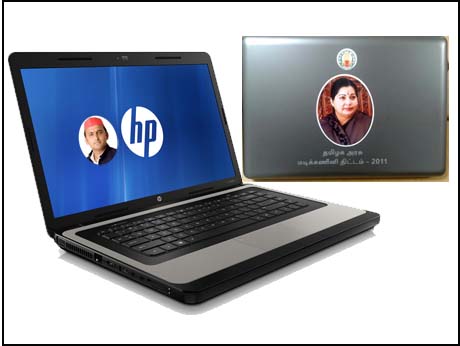
Ironically, political parties in states do for electoral gain, what the Central government should have done as its duty
By Anand ParthasarathyLucknow & Bangalore, January 26 2013: Large orders by India’s state governments to meet election promises to provide free laptops to students, have come to the rescue of a sluggish PC market and are creating new leaders in the business.Earlier this week, the government in the most populous state – Uttar Pradesh -- cleared an order for 1.5 million laptops each costing just under Rs 20,000 ( US$ 400) .
The laptops would be given free, to every student in the state who passes the Class XII examination. The order is worth Rs 28.58 billion. Fuelled by Intel Pentium 2 GHz Dual Core or equivalent AMD Processor the 14 inch HD LED laptops have been specified to come with with 2 GB of memory, a 500 GB hard disk, web cam, DVD drive, graphics card, with dual Windows 7 and Ubuntu OS. The laptops will have tools in three languages:English, Hindi and Urdu. The 331 services centres, alone mandated by the order on HP will generate jobs for 2000 engineers, estimates the Times of India.The UP government has also put out a tender for the supply of 2.6 million tablets to be provided free to Class X leavers.
In late 2011, the state government of Tamil Nadu, delivered on its own pre-election promise and awarded contracts for the supply of just under a million laptops. The largest chunk of this procurement— around 380,000 was from Lenovo, with Acer, HCL,Wipro and RP Infosystems also supplying slightly smaller quantities. Even quantities like these can completely change the dynamics of the Indian PC market where hardly 10-12 million PCs ( laptop and desktop) are sold in any year. Said Gartner in August 2012: Execution of a substantial part of the Tamilnadu government order – part of an election promise to supply laptops to students -- very aggressive price points and increased channel activities helped Lenovo’s PC shipments grow 86 percent and retain its No. 1 postion in the second quarter of 2012. ( IndiaTechOnline story)
The IT@School Project of Government of Kerala also launched a programme 2 years ago, to provide laptops and netbooks to 50,000 teachers in the State, at almost a third of market rates, thanks to a bulk deal. The Project negotiated for the procurement of 10,000 laptops and 18,000 netbooks through a national tendering process undertaken by its service provider KELTRON. It finally chose HCL, Wipro and RPInfo – all indigenous brands. (IndiaTechOnline story)
The substantially larger order bagged by HP this year may see it regain the top spot in the Indian laptop league, a spot it ceded to Acer and Lenovo in recent years. In fact government orders routinely represent just under one-fourth of all PC sales in India and are now seemingly in a position to make or break the industry – hopefully the latter.
The irony is, most of these student friendly PC initiatives have been launched by state governments with the hardnosed objective of winning elections. There was a time when the promise of heavily subsidised food grain alone was seen as a sure fire vote getter. Now political parties, attuned to the upwardly mobile ambitions of middle class voters and the fiercely competitive academic maidan or playground, see laptops and tablets as more attractive electoral freebies.
The central government has so far remained blissfully unmindful of this garam hava or hot wind, of public aspiration -- and far from launching digital divide- bridging initiatives of its own, has in fact gone into cynical reverse gear, overturning many a fiscal concession (like the zero import duty on software ) and has made the tax element of a laptop, notebook, or tablet a significant barrier to affordability.
The Finance Minister these days, does not make even the obligatory hollow reference to fuelling empowerment through IT in the annual budget speech. He will be back in that role in just a month. It remains to be seen if the initiative ( admittedly self-serving, but nevertheless innovative) shown by state governments – mostly ruled by parties in opposition – in e-nabling the grassroots education system, will shame him and his government into doing likewise. But it is unlikely, since there are no political dividends or brownie points to be won.
The promise of empowering every Indian citizen with access to information through the Internet -- and by implication, through affordable personal connectivity technology -- underpinned Indian policy till the turn of the century. Now it is just one more in a long line of forgotten promises, quietly dumped under the excuse of general fiscal tightness.
So we have this bizarre spectacle: In India today, the young get free notebooks and tablets because they are seen as vote getters, at election time, nothing more.